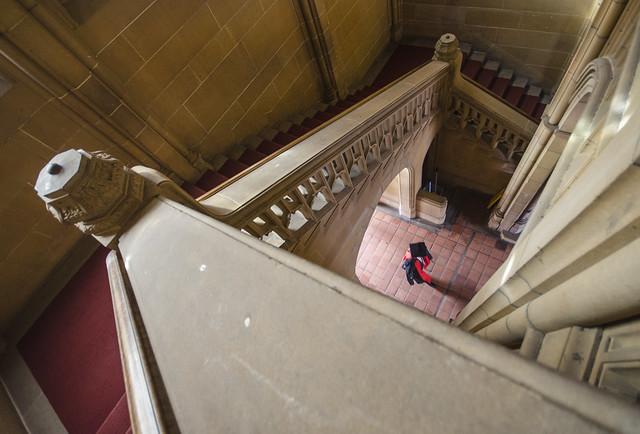China’s efforts to curb Australia’s academic freedom: what universities can do
Posted By Elaine Pearson on April 4, 2019 @ 06:00

There’s been a vigorous debate of late in Australia about the extent of Chinese government interference in domestic politics. Less has been said about what occurs on our university campuses. Pressure from the Chinese government comes in numerous ways, including censoring discussion topics, putting students from China under surveillance, and threatening those who participate in protests or events China deems sensitive.
The Australian government has focused more on Chinese political influence and on criminalising [1] acts of foreign interference. It has also created a register [2] to improve transparency of organisations and institutions working on behalf of foreign governments and political bodies.
Beyond these reforms, colleges and universities can do several practical things to protect academic freedom. After all, Chinese students enrol in our universities to get an Australian education and that should come with a strong guarantee of academic freedom.
Education is now Australia’s third largest export [3]. In 2018, 255,896 Chinese students [4] studied in Australia, nearly a third of the total international student cohort. University officials talk about the risks of being overly financially reliant on these students—but they’re barely talking at all about the risks that students from China are grappling with every day on those campuses.
Last month, Human Rights Watch released a 12-point code of conduct [5] as a guideline for colleges and universities to respond to Chinese government threats to academic freedom. The code is based on more than 100 interviews between 2015 and 2018 in Australia, Canada, France, the United Kingdom and the United States with academics, administrators and students, including some from China.
Our research found that the Chinese state’s repressive apparatus follows students from China to Australia. Some university students from China have reported that other students from China monitor what they say and do. These students have described warnings by Chinese officials to refrain from criticising the Chinese government in classroom discussions. Several academics told Human Rights Watch about incidents in which Chinese students described intimidation of their families in China because of what students had said in the classroom, or because they joined certain activities or demonstrations.
Some China scholars in Australia also censor and self-censor critical discussions. Concerns and fears about getting visas, threats to students or colleagues, and fear of irking administrators and nationalist students are all factors. One academic told me, ‘Increasingly there are these “no-go zones” that very few people are willing to research, to give public comment on, especially controversial issues like Xinjiang and Tibet.’ Another said he had been discouraged from assigning his course a ‘sensitive’ title. Many of those we interviewed said they modified their remarks inside and outside the classroom for fear of not being able to visit China or of losing funding sources, or of causing problems for Chinese students.
Many academics described discomfort with the presence of Confucius Institutes, which offer classes in Chinese language and culture, on their campuses. While this sounds like the British Council or Alliance Française, in fact the institutes are effectively outposts of China’s education ministry and are fundamentally incompatible with a robust commitment to academic freedom.
Confucius Institutes actively take steps to censor certain topics and perspectives in course materials on political grounds and take political loyalty into consideration in hiring decisions. Chinese Communist Party speeches have openly described [6] the institutes as ‘an important part of China’s overseas propaganda set-up’. Victoria University in Melbourne cancelled the screening of a documentary critical of the institutes after the university’s own Confucius Institute complained. In the US, several universities have closed or announced the closure of Confucius Institutes in part because of concerns about academic freedom. The 13 Australian universities with Confucius Institutes should seriously consider following suit.
The code of conduct provides other practical measures that universities can take to support both academic freedom and freedom of expression. For instance, universities can express commitments to these ideals though public documents, institutional policies and internal guidelines. And they should ensure that students are aware of policies in support of academic freedom, by including those commitments in orientation materials, handbooks and honour codes. The code also urges universities to work together and make joint statements and complaints with other universities in response to visa denials or other obstacles to research in China.
Besides these active measures, universities also need to respond forcefully to harassment, intimidation and threats to academic freedom. Tracking incidents of Chinese government infringements against academic freedom, including reporting annually on the number and nature of such incidents, and developing robust independent systems so that acts of retaliation or pressure can be privately or anonymously reported, are key.
Equally important, Australia needs to ensure that students and scholars from China feel truly integrated and supported, so that they are less reliant on organisations with ties to the Chinese government, including the Chinese Students and Scholars Association. Not only should all campus organisations be required to disclose their ties to foreign governments, but universities themselves should annually disclose all sources and amounts of funding that come directly or indirectly from the Chinese government.
Given the behaviour of the Chinese state, having many students from China studying in Australian universities means that safeguarding academic freedom can’t be taken for granted. As one academic told me, ‘One of our biggest failings as universities in Australia is that we don’t try to critically engage with those students in terms of their views about their country. Intimidation but also our increasing dependency on China leads to self-censorship and making decisions that are detrimental to academic freedoms.’
Article printed from The Strategist: https://aspistrategist.ru
URL to article: /chinas-efforts-to-curb-australias-academic-freedom-what-universities-can-do/
URLs in this post:
[1] criminalising: https://www.legislation.gov.au/Details/C2018A00067
[2] created a register: https://www.legislation.gov.au/Details/C2018A00063
[3] third largest export: https://dfat.gov.au/trade/resources/trade-at-a-glance/Pages/top-goods-services.aspx
[4] 255,896 Chinese students: https://internationaleducation.gov.au/research/International-Student-Data/Documents/MONTHLY%20SUMMARIES/2018/International%20student%20data%20December%202018%20detailed%20summary.pdf
[5] code of conduct: https://www.hrw.org/news/2019/03/21/china-government-threats-academic-freedom-abroad
[6] described: https://www.theguardian.com/world/2017/dec/08/confucious-institute-in-nsw-education-department-unacceptable-analyst
Click here to print.